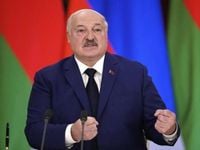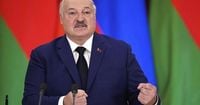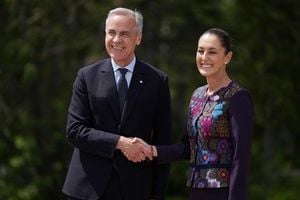On September 16, 2025, a Belarusian court handed down a four-year prison sentence to Ihar Ilyash, a prominent independent journalist, on charges of extremism—a verdict that has drawn sharp condemnation from opposition figures and human rights advocates across the globe. The decision comes just days after the government released 52 political prisoners as part of a U.S.-brokered deal, casting a harsh spotlight on the ongoing crackdown on dissent in Belarus under President Alexander Lukashenko’s long-standing rule.
Ilyash’s conviction centers on his articles and commentaries critical of Lukashenko's government. Throughout the trial, Ilyash maintained his innocence, asserting his belief in the right to free expression. In his final remarks, he declared, “freedom of speech isn’t a crime,” according to the Associated Press. Despite his defense, the court found him guilty of extremism, a charge frequently leveled against journalists and activists who challenge the regime.
The ruling has been widely interpreted as a signal that, despite gestures toward improved relations with the West, the Belarusian authorities have no intention of easing their clampdown on independent media. Andrei Bastunets, head of the Belarusian Association of Journalists, did not mince words: “Ilyash’s sentencing shows ... Belarus remains the Black Hole of Europe and one of the most dangerous places for journalists.” He noted that at least 27 journalists are currently behind bars in the country, adding, “Repressions against independent journalists are like revolving doors.”
The timing of Ilyash’s sentencing is striking, coming on the heels of what had appeared to be a tentative thaw in relations between Belarus and the United States. On September 11, 2025, the Belarusian government released 52 political prisoners following a deal brokered by Washington, which included the lifting of some sanctions on the country’s national carrier. The agreement was seen as a rare moment of rapprochement between Minsk and Washington, after years of Western isolation stemming from Belarus’s human rights record and its close alliance with Russia.
The diplomatic dance continued as U.S. President Donald Trump spoke by phone with Lukashenko in August 2025, even hinting at a possible face-to-face meeting. Such a meeting would represent a significant victory for Lukashenko, who has ruled the nation of 9.5 million with an iron grip for more than three decades. In the same week as Ilyash’s sentencing, U.S. military officers attended a joint Russian-Belarusian military exercise in Belarus—a move shunned by NATO allies in Europe. This exercise came on the heels of an incident in which Russian drones, originating from Belarusian territory, entered Polish airspace, an act condemned by Western officials as a reckless provocation.
Yet for many Belarusians and international observers, these diplomatic developments ring hollow in light of the continuing repression at home. Lukashenko’s government has faced multiple rounds of Western sanctions for its relentless crackdown on dissent, especially since the disputed August 2020 presidential election. That election, widely regarded by the opposition and Western governments as fraudulent, sparked massive protests across the country. The government’s response was swift and brutal: more than 65,000 people were arrested, thousands were reportedly beaten by police, and hundreds of independent media outlets and nongovernmental organizations were shuttered or declared illegal.
The human toll of this crackdown is staggering. According to the human rights group Viasna, Belarus currently holds 1,168 political prisoners, including its founder, Nobel Peace Prize laureate Ales Bialiatski. The fate of journalists has been particularly grim. Ilyash, who has been in custody since his arrest in October 2024, is just one of many. His wife, Katsiaryna Bakhvalava, is also a journalist and is serving an eight-year sentence on charges of high treason for her coverage of the 2020 protests.
Opposition leader Sviatlana Tsikhanouskaya, who was forced into exile after challenging Lukashenko in the 2020 election, has been a vocal critic of the regime’s tactics. Speaking to the Associated Press, she condemned the ongoing imprisonment of journalists: “The regime’s repressions are continuing despite Trump’s pleas, and the government throws new journalists in prison to fill the cells that have been freed. All those journalists have been put in prison just for doing their job and they must be freed.”
Lukashenko, for his part, has occasionally released groups of political prisoners in apparent attempts to curry favor with Western governments. On September 16, the same day as Ilyash’s sentencing, he pardoned another 25 convicts, including some political prisoners. But critics argue that these gestures are little more than window dressing, meant to secure diplomatic concessions without fundamentally changing the government’s approach to dissent.
The risks for journalists in Belarus remain acute. As Bastunets pointed out, “Belarus remains the Black Hole of Europe.” The phrase is more than just a metaphor: the country has become notorious as a place where independent journalism is not only discouraged but actively persecuted. The revolving door of repression means that as some prisoners are released, others—like Ilyash—are swiftly detained and sentenced. Human rights advocates continue to call for the immediate release of all imprisoned journalists and political prisoners, urging the international community to keep up the pressure on the Lukashenko regime.
The broader geopolitical context only adds to the complexity. Belarus’s close alliance with Russia, particularly its role in allowing Russian forces to use its territory during the 2022 invasion of Ukraine, has made it a focal point of tension between Moscow and the West. While Lukashenko occasionally signals a willingness to engage with Western leaders, his actions at home tell a different story—one of unyielding control and suppression of dissent.
For Ihar Ilyash, his family, and the many others caught in the crosshairs of Belarus’s crackdown, the future remains uncertain. The international spotlight may offer some measure of protection, but as long as the government continues to equate criticism with extremism, the risks for journalists and activists will remain high. As the world watches the diplomatic maneuvers between Minsk, Washington, and Moscow, the fate of those imprisoned for their words and beliefs serves as a sobering reminder of the high stakes for freedom of expression in Belarus.
The story of Ilyash and his fellow journalists is a stark illustration of the ongoing battle for press freedom in one of Europe’s most repressive states—a battle that shows no sign of ending soon.





